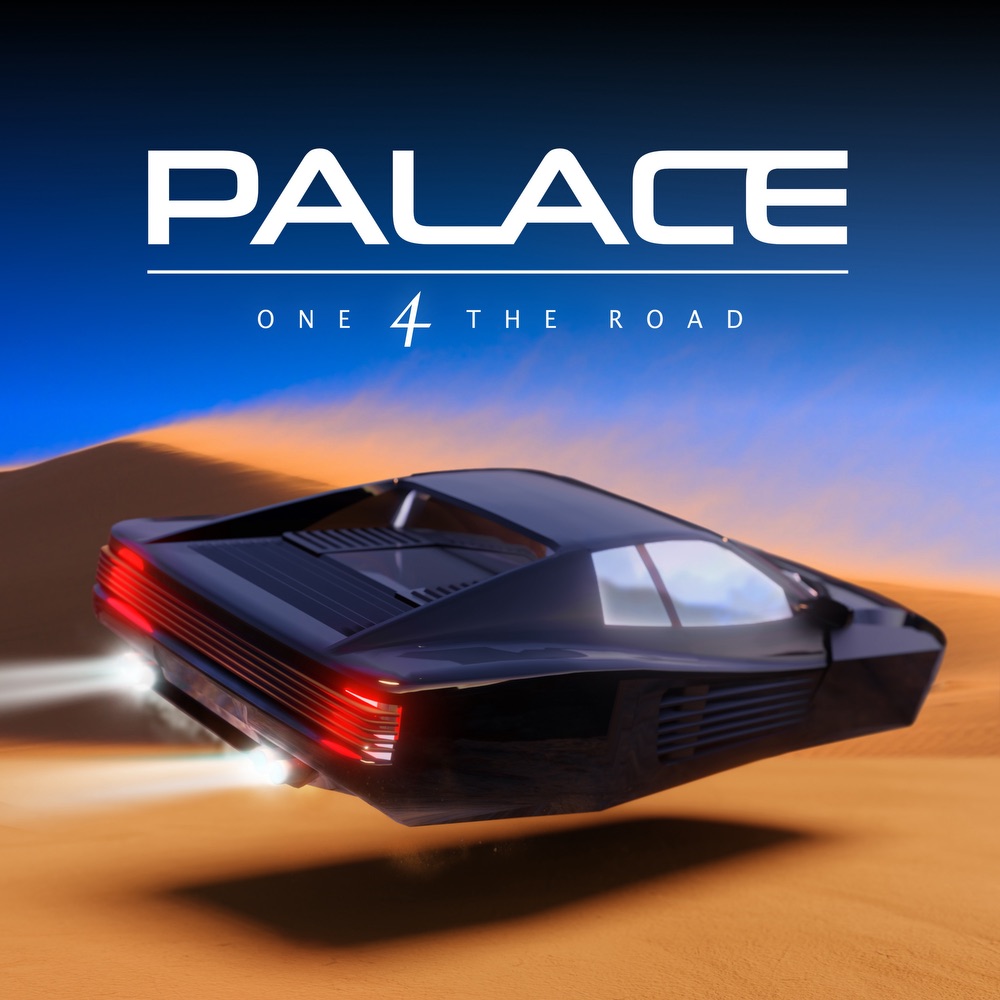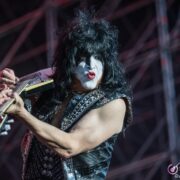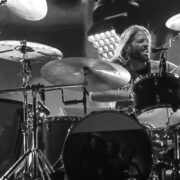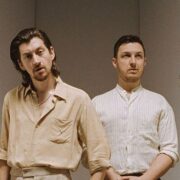Songwriter, polistrumentista e produttore, Michael Palace è tornato, lo scorso 15 luglio, con un nuovo album in studio targato Palace, “One 4 The Road”, il quarto di una carriera solista trascorsa interamente sotto l’egida di Frontiers Music. L’artista svedese ci ha raccontato la grande passione per gli anni ’80 che da sempre nutre i suoi lavori, figli di un classico AOR di stampo americano, fresco, solare e mai troppo vintage.
—SCROLL DOWN FOR ENGLISH VERSION—
Ciao Michael, benvenuto su SpazioRock. Come stai?
Ehi! Grazie, è un vero piacere parlare con te. Sto abbastanza bene.
Il tuo solo-project Palace è appena tornato dopo un album come “Rock And Roll Radio” (2020), un vero toccasana solare a pochi mesi dallo scoppio della pandemia. Come è stato recepito?
L’ultimo album ha rappresentato un leggero cambiamento nel sound dei Palace, quindi ero un po’ preoccupato per come sarebbe stato accolto. Alcuni fan pensavano che il miglior disco fosse stato realizzato in passato, tuttavia la maggior parte di loro è salita a bordo di “Rock And Roll Radio” e lo ha riprodotto in streaming quasi il doppio dei primi due album messi insieme.
Parliamo del tuo nuovo disco “One 4 The Road”, dove ancora una volta ti occupi di tutto: songwriting, strumenti, produzione e cover. Quali sono i vantaggi e le difficoltà di essere l’unico deus ex machina del progetto?
C’è ovviamente un enorme vantaggio finanziario nel fare tutto da soli, ma questo mi dà anche la possibilità di sviluppare ulteriormente molteplici abilità e rende gli album del Palace una forma di curriculum vitae per i servizi che posso offrire ad altri musicisti. Mi piace davvero anche ogni parte del processo e lo trovo davvero soddisfacente. Gli svantaggi sono altrettanti. Scrivere, suonare tutto, mixare e masterizzare significa ascoltare le canzoni così nel dettaglio che poi non sopporto di sentirle di nuovo fino a qualche mese dopo che sono terminate. Devo anche essere molto critico con me stesso, il che a volte potrebbe rendere più difficile l’essere creativo.
La tua creatività è ancora alimentata dagli anni ‘80, quindi cosa trovi di così stimolante in questo decennio, nella musica e oltre? E come è iniziata la tua passione?
Ultimamente, avendo preso parecchio dagli anni ‘80, ho preso molta dell’ispirazione da decenni più vicini ai miei. Il brano “Westbound”, ad esempio, è stato un tentativo di combinare il pop punk dei primi anni 2000 con il suono AOR dei Palace. È stato molto divertente avvicinarsi al genere da questa nuova prospettiva ed è qualcosa che continuo a sperimentare per mantenere le cose interessanti. Il fascino degli anni ’80 non è svanito ed è sempre lì. Deriva da tutti i film d’azione di quell’epoca che ho visto mentre crescevo, ulteriormente rafforzato dalla colonna sonora del videogioco “Grand Theft Auto: Vice City”, pubblicato nel 2002.
L’artwork mi ha fatto pensare alle atmosfere di “Dune” e “Blade Runner 2049”, film, curiosamente, entrambi diretti da Denis Villeneuve. In che misura la cinematografia di fantascienza influenza la concezione della tua musica e dei tuoi testi?
Stupendo! Questa è stata davvero una parte dell’ispirazione per l’artwork dell’album. Ho adorato “Blade Runner 2049”, tuttavia l’originale “Dune” diretto da David Lynch con la colonna sonora dei Toto aveva un certo fascino che, per me, si è perso nella nuova versione, ma il film mi è comunque piaciuto molto. Tuttavia, il mio modo di scrivere non è molto ispirato alla fantascienza. Mi piace soprattutto parlare di cose di tutti i giorni.
Per una generazione precedente a MTV, la radio era forse il mezzo più importante quando si trattava di scoprire nuova musica. Pezzi come “Time Crisis”, “World Gone Mad” e “Living The Life” potrebbero effettivamente suonare in heavy rotation sulle frequenze FM, facendo rivivere le glorie del melodic rock del passato?
Se fossero interpretate da qualcuno più carismatico e di almeno dieci anni più giovane, forse. Il rock e il pop punk degli anni 2000 sta avendo un enorme revival in questo momento, grazie a molti giovani che lo scoprono e lo rendono di nuovo cool. Non credo che il rock melodico degli anni ’80 entrerà in heavy rotation nelle radio mainstream fino a quando le persone che lo suonano non diventeranno qualcuno con cui i ragazzi possano relazionarsi.
Con “Cancel The Flight” e “Loneliest Night”, invece, sembra di correre di notte sulle autostrade di Miami, con le luci al neon che illuminano la strada. Chi vorresti che salisse in macchina per chiedere una collaborazione artistica? Puoi scegliere più di un autostoppista …
Mi piacerebbe scrivere alcuni successi pop con Max Martin, produrre country con Dan Huff e fare della fantastica musica degli anni ’80 con il cantante in Forêt De Vin.
Canzoni come “Money Can Kill” o “Fifteen Minutes” mostrano un’ottima qualità compositiva attraverso un sound rétro molto fresco. Non pensi che ad alcune band AOR attuali piaccia ricordare troppo il passato, dando l’impressione che scrivano musica non molto spontanea?
Sento che questa descrizione si adatta a quello che ho fatto (ride, n.d.r.). Il mio rimedio è stato ascoltare tutta la musica tranne l’AOR e trovare ispirazione in altri generi; sono felice che tu abbia pensato che riesco a farla sentire fresca. Penso che il problema sia che la maggior parte delle band AOR non ricordi abbastanza. Ecco perché Nestor, Chez Kane e Crazy Lixx hanno così tanto successo. Sono andati fuori dai binari degli Eighties e nella mia mente hanno vinto la gara hard rock/AOR anni ‘80. Ora è il momento di provare gli anni ‘80 o di provare qualcosa di nuovo.
“One 4 The Road” è il tuo quarto album uscito a nome Palace: non avresti voglia di sperimentare qualcosa di più? O i fan non devono preoccuparsi di strani cambiamenti?
La maggior parte dei fan non deve preoccuparsi. Con ogni nuovo album, prendo in considerazione il loro feedback quando decido dove andare dopo. Alla fine, sono i fan che ascolteranno di più il disco, quindi cerco sempre di creare qualcosa che piaccia loro.
Scrivi e suoni anche in altre band. Ti piacerebbe in futuro avere un progetto solista dedicato esclusivamente alla synthwave, tanto di moda oggi? Anch’essa ricorda gli anni ’80 …
In realtà lo faccio dal 2018, prima che diventasse di moda. HOLOFLASH è il nome del progetto e ho pubblicato un album chiamato “Fusionwave”. È un miscuglio di pop aromatizzato degli anni ’80 e un po’ di smooth jazz dello stesso periodo.
Siamo nella stagione dei grandi festival estivi. Ti vedremo coinvolto in qualche evento dal vivo? Forse in Italia?
È così fantastico vedere la scena dal vivo tornare dai sotterranei della pandemia. Tuttavia, continuerò a trascorrere il mio tempo in studio, scrivendo e producendo altra musica.
Ti ringrazio molto per il tuo tempo. Lasceresti un messaggio ai tuoi fan italiani e a coloro che leggeranno questa intervista?
Grazie per la divertente intervista! Ciao (in italiano nell’originale, n.d.r.) a tutti i fan italiani! Vi apprezzo davvero tutti e vi ringrazio per il continuo supporto. Spero che tutti voi trascorriate una bella estate!

— ENGLISH VERSION —
Hi Michael, welcome to SpazioRock. How are you?
Hey! Thank you, a real pleasure to talk to you. I’m doing pretty good.
Your solo-project Palace has just returned after an album like “Rock And Roll Radio” (2020), a real solar panacea a few months after the outbreak of the pandemic. How was it received?
The last album was a slight shift in sound for Palace, so I was a little nervous about how it would be received. Even though some fans felt like the best work was already in the past, the majority came along for the ride and have streamed “Rock And Roll Radio” almost twice as much as the first two albums combined.
Let’s talk about your new record “One 4 The Road”, where once again you take care of everything: songwriting, instruments, production and cover. What are the advantages and difficulties of being the only deus ex machina in your project?
There’s obviously a huge financial advantage in doing everything yourself but it also gives me a chance to further develop multiple skills and makes the Palace albums a form of curriculum vitae for services I can offer to other musicians. I also really enjoy every part of the process and find it really satisfying. The disadvantages are just as many. Writing the songs, playing everything, mixing and mastering – means I’m listening to the songs in excruciating detail, to the extent that I can’t stand to hear them again for at least a few months after they’re done. I also need to be very critical of myself, which might make it harder to be creative at times.
Your creativity is still fueled by the ‘80s, so what do you find so inspiring about this decade, in music and beyond? And how did your fascination with the ‘80s started?
Lately, I’ve become a little burnt out with the 80’s and have found a lot of inspiration from decades closer to my own. For example the song “Westbound” was an attempt to combine early 2000’s pop punk with the Palace AOR sound. It was a lot of fun to approach the genre from this new angle and is something I continue to experiment with to keep things interesting. My 80’s fascination isn’t gone though and is always there. It stems from all the 80’s action movies I watched while growing up, further reinforced by the soundtrack in the “Grand Theft Auto: Vice City” videogame released in 2002.
The artwork made me think about the atmospheres of “Dune” and “Blade Runner 2049”, curiously both directed by Denis Villeneuve. How much do sci-fi cinematic images influence the conception of your music and lyrics?
Awesome! That was indeed some of the inspiration for the album artwork. I loved “Blade Runner 2049”, however the original “Dune” directed by David Lynch with the Toto soundtrack had some charm that was lost in the new one for me but I still really enjoyed it. My songwriting isn’t very sci-fi inspired though. I mostly like to write about everyday things.
For a pre-MTV generation, the radio was perhaps the most important medium when it comes to musical discoveries. Could pieces like “Time Crisis”, “World Gone Mad” and “Living The Life” actually appear in a heavy rotation compilation on FM frequencies, reviving the melodic rock glories of the past?
If they were performed by someone more charismatic and at least ten years younger perhaps. 2000’s rock and pop punk is having a huge revival right now, due to a lot of young people discovering it and making it cool again. I don’t think that 80’s melodic rock will come into heavy rotation on mainstream radio until the people playing it become someone the kids can relate to.
With “Cancel The Flight” and “Loneliest Night”, on the other hand, it seems to run on the Miami highways at night, with neon lights illuminating the street. Who would you like to get in the car to ask for an artistic collaboration? You can choose more than one hitchhiker…
I’d love to write some pop hits with Max Martin, produce country with Dan Huff and make some awesome 80’s music with the singer in Forêt de Vin.
Songs like “Money Can Kill” or “Fifteen Minutes” show fine compositional quality through a retro sound that is very fresh. Don’t you think that some current AOR bands like to reminisce too much about the past, giving the impression that they write music that is not very spontaneous?
I feel like that description fits what I’ve been doing (he laughs, n.d.r.). My remedy has been to listen to all music except AOR and find inspiration in other genres, I’m glad you thought I managed to make it feel fresh. I think the problem is that most AOR isn’t reminiscing enough. That’s why Nestor, Chez Kane and Crazy Lixx are so successful. They go all-out 80’s and have won the AOR/80’s hard rock-race in my mind. Now it’s time to either go full 80’s or to try something new.
“One 4 The Road” is your fourth album released as Palace: wouldn’t you experiment more with the sound? Or do fans not have to worry about strange changes?
Most of the fans don’t have to worry. With each new album, I take the fan feedback into consideration when deciding where to go next. In the end, it’s the fans that will listen to the album the most so I always try to make something that they’ll enjoy.
You write and play in other bands, too. Would you like in the future to have a solo project dedicated exclusively to synthwave, which is so fashionable today? It recalls the 80s, too…
Well, I’ve been doing it since 2018 before it was fashionable. HOLOFLASH is the name of the project and I have released an album called “Fusionwave”. It’s a mixed bag of 80’s flavoured pop and some 80’s Smooth Jazz.
We are in the season of the big summer festivals. Will we see you involved in any live events? Maybe in Italy?
It’s so awesome to see the live scene return from the pandemic dungeons. However, I’ll continue to spend my time in the studio, writing and producing more music.
Thank you very much for your time. Would you please leave a message to your Italian fans and to those who will read this interview?
Thank you for the fun interview! Ciao to all the Italian fans! I really appreciate you all and thank you for the continued support. Hope you all have a beautiful summer!








